- From Faith Current: “The Sacred Ordinary: St. Peter’s Church Hall” - May 1, 2023
- A brief (?) hiatus - April 22, 2023
- Something Happened - March 6, 2023
This morning I had a stray thought: what would John Lennon have done if he’d survived? Where would he have gone? Now don’t get too excited: I was all set to write a big long thinky post about this, but today has been nothing but furious fingers typing typing typing, so I will keep it short, and let the commentariat do the opining for me.
In Life After Death for Beginners, my novel about a Lennon-like character who survives an assassination and has to find out who shot him and why, I put the main character here in Santa Monica. I am not serious about that, but I think it makes sense for several reasons. First I genuinely do think that John Lennon liked the sea, and liked it here—there’s a lot to like—especially back in the 70s-80s when it was a sleepy little beach town. (Plus, in LA they know how to treat rich people. There’s a reason all the petro-rich Iranians came in the 70s and 80s; the Westside’s a sweet place for exile.) Second because he would be far away from all the people who’d he’d known and associated with for the five years previous. And finally, because I was so goddamn sick when I was writing it, it was impossible for me to travel for research. So I was writing what I could write.
But the real Lennon? I don’t think he would’ve stayed in New York City, not for a second. His love of NYC seemed to stem from being able to move around like a non-famous person, and that would’ve been impossible. (I think he would’ve been gratified by the outpouring of love; for a bit.) He didn’t like nightlife; he didn’t seem to want to associate with the old pals. But he did like to travel, had been to Bermuda in 1980, Japan several times (dig this neat page), and planned to visit the UK in 1981.
My guess is he would’ve hightailed it to Japan, for two reasons: Yoko, and no guns. The rigidity of Japanese society would’ve felt like safety to him, and he would’ve been able to spot a bonkers Caucasian fan coming a mile away. However, I think that eventually the isolation of being a foreigner in that country would’ve gotten to him. So I wouldn’t be surprised if he’d done a blend of what George and Paul did.
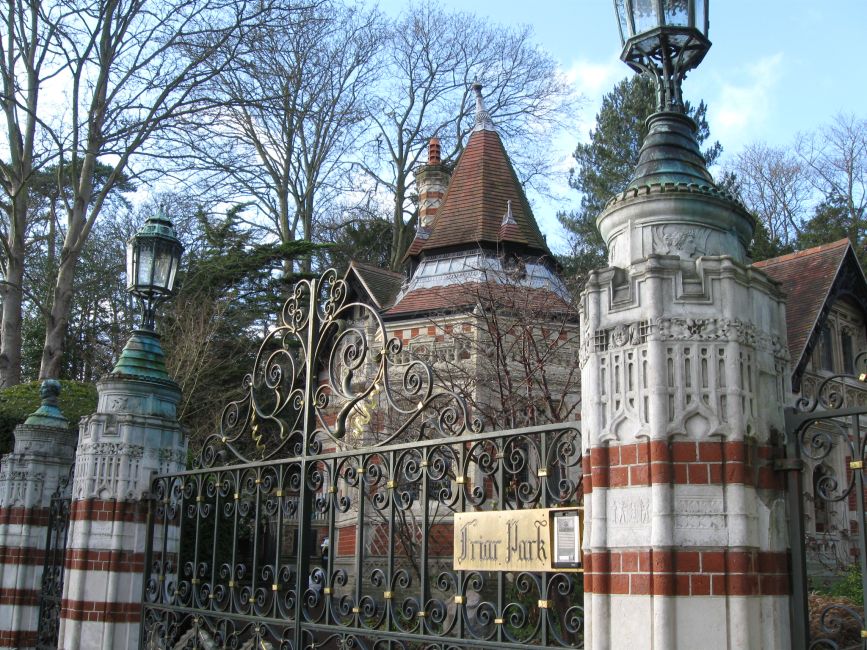
George picked basically one place, FPSHOT, and made it his castle. Behind those walls, he was famously prickly/uninterested in housecalls from random fans (and can we blame him)? But as his own near-miss with an assassin eventually showed, that strategy has flaws. (Actually, I don’t think Friar Park had a wall around the property until 2009. Very different from These United States; in the US, the wall is the point.)
Paul, on the other hand, has many houses—London, Scotland, Beverly Hills, Arizona, Long Island, add more in the comments—so he effectively lives everywhere…and nowhere. In the end—by age 79—I betcha that’s what John would’ve done. Been seen places occasionally, living the private jet, private club, cosseted multinational life of the very wealthy. We’d have seen photos of him at weddings, graduations, and so forth. Elton’s wedding in 1984; Cyn’s funeral. But unlike Paul, I don’t think he would be spotted bopping around Beverly Hills.
What do you think?

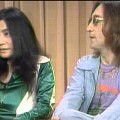

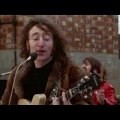
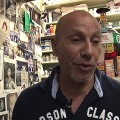
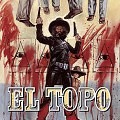
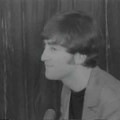
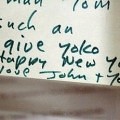
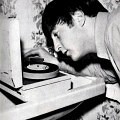

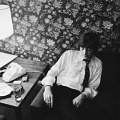
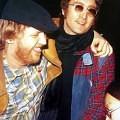
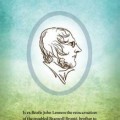
Ooh, to me, this all depends on how the Eighties go for him. Do he and Yoko get divorced? If so, I could see Yoko keeping the Dakota, just as she did during the separation, and John moving to one of their other properties—somewhere on Long Island Sound, or upstate—as his main residence. He loved Scotland as a boy and his next move could well have been somewhere secluded and more pastoral, and also laden with reminders of early childhood—but still close enough to Manhattan when he had the urge to party. In the longer term, I agree it’s likely that he would have ended up somewhat like McCartney, with residences all over the UK and America. But being more of a homebody, I think John would have needed more of a defined home base. And if he got divorced, some of this would also depend on what Wife #3 (new parlor game: what would SHE have been like? Is she a caring but independent artist? Is she a Scientologist? Literally anything is possible!) wanted.
Had he remained with Yoko, I can also see him living in Japan for a while. I also do not see this coinciding with a period of good mental health for him. What John thought he wanted—predictability, isolation, public deference—and what was good for him were not necessarily the same thing, and I think Japan would’ve been the Dakota Years Times Five but without as many drugs. It’s so hard for me to conceive of J&Y staying together as anything other than a business partnership that I have a hard time imagining them moving to Japan together, though, where John would’ve been REALLY dependent on her, and where she would’ve been further away from the Western music scene she apparently wanted to dominate in her own right. In that scenario, I could see Lennon spending most of his time in Bermuda or Jamaica, perhaps hanging out with fellow British tax exiles/recovering junkie Keith Richards.
John with no shooting: he and Yoko part ways, the Beatles re-form, maybe he becomes a Scientologist. (I’m serious.)
.
John with any kind of fan violence: he and Yoko bond, he isolates, and stops making music publicly.
.
George learned his disdain for fans from John. John’s relationship with fans was…complex, tending towards negative. Maybe that was changing, but not if he felt physically at risk.
There was a lot of stuff going on in 1980 in order to make that assassination attempt a successful one, but John’s relationship with Beatles fans that you describe helped to the conditions necessary for it to happen. That mixture of deep, deep need for fans’ worship, and the aversion to fans thinking they understood John that led to the cynical/teasing/cryptic word games of songs like Glass Onion, creates a mix where a suggestible, mentally unwell person can perceive a type of power in Lennon that’s well beyond “poet” or “entertainer.” Cultural figures who have that kind of power either have extremely secure protections between them and the public, or they get killed (directly or indirectly).
I think Dylan, for example, recognized this, and that explains why he spent his entire post-1966 career running from the guru/prophet mantle people tried to bestow upon him. John recognized this too, but could not consistently square it with his other emotional needs.
I sense there’d have been a return to the UK, and to Paul specifically. After that is anyone’s guess.
Isn’t there scuttlebutt that they had a recording session booked?
.
It’s like 1975 in New Orleans all over again.
That’s what a few different people who could’ve been in a position to know have said. A commenter here named Elizabeth posted an interview in which a music industry person claimed studio time was booked for Dec. 9 in London (but I think canceled while Lennon was still alive). All very sad. And the stop smoking cure in 1975 didn’t even work.
I think the “smoking cure” worked great. It just didn’t cure anybody’s smoking.
I agree, there’s a good chance that could have happened.
And then after a few years, he becomes disenchanted and breaks free. Only trouble is they make his life a living hell after he writes a “Sexy Sadie” song about David Miscavige.
John had a tendency to dive headfirst onto a new therapy or trend or treatment, become disillusioned when it didn’t immediately solve all his problems, and then look around (not see a mark) and realize he was the mark. And then he’d complain to the press or write a song.
Which is fine if you’re dealing with the Maharishi or Arthur Janov. But the scientologists?
Yes, agreed. The thing about Maharishi and Janov was, whatever you feel about their modalities, they and their organizations seem to be basically benign. You can leave them.
Yes, and in my experience that’s completely typical of people in immense pain looking for some type of therapy (traditional or otherwise). The therapist/guru is not going to just slip you the answer one day.
Michael B., couldn’t agree more that what John thought he needed and what he really needed were sometimes poles apart — true for us all at some points, but tragically true for him in the late 1970s, IMO.
Setting aside for the moment the question of fan violence, I think a lot would depend, post-1980, on what happened with “Double Fantasy” and the projected tour in support of it. The album is recalled in almost wholly positive terms today, but initial reviews were more mixed. And what exactly would that John and Yoko tour have looked like? How would it have played, and how would they both feel about it?
My sense is that 1981 would have been a big year for John and Yoko in determining what the future of their relationship, and John’s music career, were going to look like.
I think that’s right, @Nancy. And I think it’s FAR from certain that a Double Fantasy world tour would’ve been a smashing success. The smart money would’ve been against it, in fact — “domestic bliss” doesn’t really fill stadiums.
.
The interesting thing to ponder is: what then? I think John would’ve hightailed it back to Paul and tried to kick everyone’s ass again. I think his ego would’ve demanded it.
Elton John has some stories to share:
https://www.showbiz411.com/2019/10/14/elton-john-says-in-new-memoir-that-yoko-ono-asked-him-not-paul-mccartney-to-finish-a-bunch-of-john-lennons-songs
Do you not reckon John’s ego would have demanded that he succeed *without* Paul Michael? That’s the track he’d been on since 1968, and the day of his death he was carrying a tape of “Walking on Thin Ice”, the song he was determined to turn into a #1 hit. I would have thought crawling back to the hugely commercially successful Paul would have felt like giving up.
I dunno. That’s my best guess: I dunno. Sometimes Paul was his “brother,” sometimes he was his deadly rival.
.
Remember: Double Fantasy wasn’t selling great. Reviews were just OK. And John might have *wanted* to turn “Walking on Thin Ice” into a #1, but given that his last one was with the incredibly hot Elton John in 1974, his ability to turn any tune into a #1, much less one sung by Yoko, was really dubious.
.
I think he might’ve woken up one morning and realized, “If I’m getting back into the game, for reals, I need Paul.”
.
Or he might have gone the other way: the idea that, at 40, he no longer had to compete with his peers for the dollars of 16-year-olds. And I think that if John had lived and done that, he would’ve encouraged Paul to feel the same, and together they might well HAVE become titanically successful again. But Lennon alone? Not a hitmaker in 1980, before his death.
.
Even with that push, which is impossible to express if you weren’t alive then — “Thin Ice” was a flop. In 1981, I was a HUGE Beatles and John fan, deep in grief, and buying records (LPs and 45s). I didn’t buy “Walking on Thin Ice,” of Season of Glass, and even if I’d been tempted, the sleeve would’ve stopped me.
It’s always fascinating when hugely gifted people don’t understand their own gifts, and John and Paul share a strange talent for underrating their finest work and overrating whatever idea floated into their head over breakfast. Note that I didn’t say I agreed with John about WOTI – it’s good in an eccentric way and has some great guitar on it, but it was hardly going to be the next Voulez-Vous.
.
I also think J&P shared this old-world showbiz desire to appeal to absolutely everybody and reach #1 with every single. They’d kick against the impulse every now and again and release a JL/POB or a McCartney II, but they were pop stars at heart. From the mid-’60s on you get all these bands ploughing psychedelic, prog or roots furrows and not particularly caring if they sell (Led Zeppelin didn’t even release singles!), but the Beatles fundamentally belonged to an older generation. To this day it’s unthinkable to Paul to do a live show without giving the public EXACTLY what they want – no reinventions or experiments allowed!
.
I really like the idea of a 1980s John walking a Talking Heads-ish middle line between pandering to audiences and deliberately alienating them, and I think he had it in him.
I think you’re right, I think he had that in him, but I think his mental state and working partners would have determined everything. For example, “I’m Losing You” with Cheap Trick is by far the better track, but…
.
Could he really have grokked New Wave? Sure. Would he have been surrounded by people who allowed Best Idea Wins? Not sure.
Couldn’t agree more Mike.
Ha ha ha best comment reply EVVVVVVEEEERRR!!!!
To this day it’s unthinkable to Paul to do a live show without giving the public EXACTLY what they want – no reinventions or experiments allowed!
Too true. The most different I think I ever remember him getting, besides lowering keys, was a very brief reference to the Earth Wind and Fire horn line at the tail end of “Got to Get You Into My Life” on his ’79 tour.
An enjoyable experiment was Paul blending A Day In The Life/Give Peace A Chance in his live shows.
@Sam, I’ve seen him do the odd thing like speed up the end of Helter Skelter or drop a Hendrix riff into the coda of a song, but I wouldn’t really call that experimentation – it’s not on the same planet as Zappa’s reinventions or Dylan’s complete overhauls. Fundamentally Paul and Jagger are give-the-audience-what-they-want guys and Dylan and Zappa are I’ll-do-what-I-want guys. Both have their place but I wish Paul would stretch himself that bit more – the problem with pleasing everyone is you never get the chance to offer your true fans a deeper kind of pleasure. It’s like with classical – “Beethoven’s greatest hits” concerts will always sell better, but people who love the man’s work want to hear the Pastoral Symphony all the way through and will pay good money for it. Why not have both?
I’ve thought about this too, and I wonder if McCartney needs a level of predictability and audience pleasing to feel comfortable performing. I think Beatles-level fame did a number on them all, and I think that maybe McCartney is able to perform for the public only so long as there’s a screen in place — a translucent one, but a screen. To me it goes with the stories about Lennon, Harrison, and Linda that he tells on stage: I think he may stick to the same ones because doing so makes the emotions manageable.
That sounds about right – but I think there’s an overwhelming need for people’s approval there too, and feel he’d be much happier and more relaxed if he could let it go. I sense a deep sadness and insecurity in Paul that comes through even in frothy stuff like the Carpool Karaoke video. You just want to take him aside and say, ‘It’s OK. You’ve done it. Literally the whole world loves you now. Just relax, do whatever the hell you want to do and we’ll love you anyway.’
Yikes, that’s what happens when you’re typing on a cracked screen while walking to something you’re slightly late for. Could some kind soul please add ‘think’ after ‘I’ and add an s to ‘come’?
This is the tragedy of NOT identifying alcoholic family patterns (assuming that this is where Paul’s behavior comes from) and rooting them out as best you are able. Even the relatively more benign versions, like Paul’s, really RUN you. They are a compulsion.
.
Paul’s strategies have worked for him, but none of us should ever doubt that he’s paid a high price, emotionally and psychologically, as a result. And of course we’d want him to rest and enjoy. But that may not be possible without a pretty major personality overhaul, and the “success” weighs against that.
Yes, I very much think approval is part of it too for McCartney. In his own way he’s just as wounded as Lennon was, and this is the form it takes for him.
What a great site. Thank you.
So…If John were alive, what would he be doing? Here’s what I think:
* Outspoken about LGBTQ rights. Honest about his sexuality.
* Outspoken about mental health. Honest about his mental illness.
* Outspoken about the risks of psychoactive drugs. Honest about his history of dependence.
* Enjoying playing, singing and writing songs, including with Paul McCartney.
* Enjoying the healthiest days of his life.
Of course, I’m an optimist.
Just curious where do you think John would’ve moved or made his home if he was forced to leave the USA early? If that deportation stuck and he had to leave.
I know I’ve heard Toronto somewhere. Right back to England? Some kind of artsy cultural capital somewhere?
In 1976? Probably London.
.
In 1980, after being shot? Probably Tokyo.
.
I haven’t been to Toronto, but if you listen to Lennon talk about NYC, I think it would be too small. (Even though I’ve heard Toronto is very NYC-like.)
@Andrew Roblin: “So…If John were alive, what would he be doing? Here’s what I think:
* Outspoken about LGBTQ rights. Honest about his sexuality”
There is as much proof that John was gay or bisexual as there is that he and Paul had an affair, yet people accept it as fact. He never declared himself gay/bi and no sexual relationship with a male ever came to light. He doesn’t show up on any official LGBTQ lists of famous people. Rumors, anecdotes from questionable sources and speculation isn’t enough to make the cut. I agree he would be pro-gay rights today, as he apparently was in the 70s.
@Michelle, while I’m all for declining to draft people into movements after their death, I think there’s plenty of circumstantial evidence that John was certainly bi-curious, if not actively bisexual. As of December 9, 1980, you can’t get more definitive than his widow saying he was bi-curious, on many occasions. Plus there’s the stuff in Goldman, which might be made out of whole cloth…if it weren’t surrounded by a bunch of other things. Of all the rockers Lennon could pick to collaborate with, he picked Bowie. Of all the rockers Lennon would pick to be closest to in the Dakota years, he picked Elton. A bi-curious Lennon is informed speculation.
.
On the other hand, there is ZERO proof that Lennon and McCartney had a sexual affair. Neither of them said anything like that, and no one in the inner circle has said anything like that. The only “proof” is that they had a spectacular falling out, just after India, and the texture and timing of that falling out naturally suggests a sexual angle; but that’s a guess. Lennon’s bi-curiosity is, IMHO, 85% likely, because of things he said, Yoko’s said, and so forth. YMMV, but I think equating the two massively overstates the possibility of a Lennon/McCartney hookup.
.
To put it another way: if there had been any possibility of J/P–the merest whisper–Goldman would’ve put it in his book. He was surely looking for just that. The rest of Lives suggests he was.
As much as I respect Yoko, she falls into that questionable sources category for me. 🙂
I mean c’mon, she lost me when she said that John wanted to pursue his bi-curious desires, but couldn’t find a man who was both very attractive and highly intelligent. Really? If John could get any woman he wanted, the same is true of men. There are plenty of men that fit that description, and John had to have met a few. Some would say Paul is attractive and intelligent enough. It almost sounds like a swipe at Paul. Like when she said that she felt she knew Stuart because a day didn’t go by where John didn’t mention him. I don’t believe that either, even as a bit of hyperbole. She must have known about Paul’s rivalry with Stuart, which was not unlike his rivalry with her. And she knew of his doubts about John’s love for him.
As for Goldman and the John/Paul issue, he was one of those biographers who presented Paul as a mere business partner in John’s life, barely a friendship between the two. When you start at that meager (and false) position, why would he even consider digging up anything on the two.
why would he even consider digging up anything on the two
Because that would’ve been the single most scandalous thing Goldman could’ve written. It would’ve been BEYOND EXPLOSIVE in 1987 to suggest that in a biography published by a major publishing house.
.
If it were only Yoko — like for example, if Heather Mills came out and said Paul was bi — I wouldn’t credit it. But it’s not just her. It’s John’s relationship with Stu (and what “artistic” meant, for men, in the Liverpool of the late 50s); it’s his relationship with Brian (and the trip to Spain; and his beating Wooler); it’s his sexual libertinism in general (Two Virgins; the lithographs); it’s his association with Rock Bisexuals; it’s Goldman’s details about Thailand…I mean, I don’t care. But it seems quite plausible to me.
Fair enough. It’s plausible. John seemed like one of those people who would try anything at least once, even considering trepanning. The Thailand thing involved minors, didn’t it? Goldman also accused John of *raping* Brian. Whatever positive his book may have entailed, it should be thrown out on those serious charges alone for lack of evidence.
I don’t want to re-open the J/P lovers discussion again, but I don’t agree that John and Paul never said anything like that. Does joking count? Because they definitely joked about that. You know of John’s 1980 Playboy interview, his self-Q&A in 1974 in Warhol’s magazine (you have it on your blog), Paul’s “in bed” comment and his “Menlove Ave… teehee.. get it?” among other innuendo. Why joke about it? Are they just trolling the shippers, which is an internet phenomenon that didn’t exist in John’s lifetime? Why plant that seed in impressionable young fans and Howard Stern’s minds?
@Michelle, one’s reading on all of this stuff is determined by one’s own sexuality and gender identity, one’s own experience of others, and one’s time. I don’t know anything about you, but I don’t think I’m close enough to John in age or background to judge with any degree of accuracy, and my life experience has been so vastly different as regards sex.
.
But, all that having been said, taking the totality of what I know about him, what he was like, who he was close to, etc, I think it’s highly likely that he was bi-curious. I’m not going to get into the rest, except to say: I have no interest in looking for “clues,” and I would discourage others from doing so. “Menlove Ave… teehee…get it?” is a fairly typical joke by a heterosexual man of Lennon’s era. (And mine, fwiw.) It’s only post-internet that such stuff has become infra dig.
I don’t see Lennon abandoning NY for good. The Dakota residence would remain. If his marriage to Yoko continued indefinitely I can see him living in NY 4 or 5 months out of the year, the rest of the time in England as well as perhaps some kind of away from it all vacation estate on some island or Australia. Perhaps he spends more time out on Long Island in the Hamptions in some palace.
If he split from Yoko…and I’m 50/50 this would happen…I think she stays holed up in the Dakota as she is now with John embarking on a less debauchery filled Lost Weekend 2.0. It wouldn’t be quite like the first one…John of course was much more attached to Sean so he’d be more NYC based and make more of an effort to stay clean and be active in Seans life (or perhaps like Keith Richards, in one of the wealthy suburbs that surround NY…Connecticut, Northern NJ)
I do see John spending more and more time in England and perhaps stretches with Aunt Mimi as her life drew to a close (1985-1991)
As nutty as this sounds…if he actually finally fully split with Yoko where he was mentally through with her, I can see John making a concerted effort to help Julian get his own music career off the ground and cement him as an established, respected artist. I think John would actually take pride and think of it as a way to one up Paul. “I’ve got the most talented Beatle offspring!”
Except Paul called attention to the name in the context of his song Early Days and his fond memories of John and him as kids. I’m a straight female and I too always found the name Menlove Ave rather hilarious. I didn’t think anyone from Liverpool would, but what do I know.
@Michelle, as long as homosexuality is taboo, it’s going to generate jokes like that. Back then, because it was very taboo, it was doubtless very common to make that joke. Now, probably less so.
.
Wherever the taboos are, that’s where people make the jokes, to relieve their discomfort.
.
Yes, I think there’s a good chance that would have happened. He liked the idea of being someone else’s George Martin. He told an interviewer he thought about “resurrecting Elvis” but it was impossible because he was too in awe of Presley to work with him in a recording studio.
But no such problem with Julian. I can imagine John directing the sessions, hiring the backup musicians, deciding on mic placement and sound levels, even providing background vocals or contributing a song or two. The toughest part would have been taking “nepotism” questions from the press afterwards during the album’s launch!
I found the exact quote from Paul in Rolling Stone: “It was a place called Menlove Avenue. [Pauses] Someone’s going to read significance into that: Paul and John on Menlove Avenue. Come onnnnnnn.”
Hahaha
@Michael, I don’t know why I didn’t have you clarify this point before but: “Of all the rockers Lennon could pick to collaborate with, he picked Bowie. Of all the rockers Lennon would pick to be closest to in the Dakota years, he picked Elton. A bi-curious Lennon is informed speculation. On the other hand, there is ZERO proof that Lennon and McCartney had a sexual affair.”
So let me see if I have this straight (exuse the pun). Hanging out with two fantastic artists like Bowie (who once called himself a closet heterosexual) and Elton makes a fellow male artist bi-curious, but it’s a stretch to say that a lyric such as “I’m in love with a friend of mine” in a song Paul said was about “longing” for John sounds suspicious? I’m not saying they had a sexual affair necessarily, but why is it informed speculation to argue that John was bi-curious and not Paul?
This is just how *I* look at it, @Michelle — and it’s based on the sexual mores of my gender (male), within my generation (b.1969) and country (American), plus a lot of outside reading about sexuality because I have a real interest in it. I don’t think that John’s hanging/collaborating with Elton and Bowie from the mid-70s onward by itself suggests bi-curiosity; but when put within the entire constellation of information that we know about John, I think it fits with the reasonable assumption that he was bi-curious.
.
Lennon could’ve collaborated (and, more importantly, publicly allied himself with) anybody in the mid-70s. Bowie and Elton were HUGE, and that’s part of the decision, but Lennon remained friends with Bowie, and close friends with Elton. It’s difficult to express now how much bisexuality–really, homosexuality–was at the center of Bowie and Elton’s public persona during the precise time John was publicly affiliating his own public persona with them. Their sexuality was not the only reason, or even the primary reason, John thought, “I’ll record with them.” But not only did he *not fear* what their public gender performance (and assumed private sexual behavior) would do to his image, he seems to have relished the post-Gay Lib openness in this regard. Okay, so that doesn’t make him gay, or bi, or even a bicurious straight guy who dabbled. But it’s tough to explain to anybody under the age of 40, especially female people, just how much of a “third rail” homosexuality was for men in 1975, or 1985, or even 1995. Even in my generation, twenty years after Stonewall, to admit desire for other men was to basically turn in your Man Card; there was no “straight but not narrow.” Certainly in 1975, you would be forced to carve out an identity within the gay male community — if you could, if they’d have you — which had its own pretty rigid sets of assumptions and behaviors Was Lennon a twink? A bear? A leather daddy? If he was none of these, but just wanted to have occasional sex with other men, where would he fit? Where, as a celebrity, would he fit? All this is Not A Deal today, or Less of a Deal, especially if you’re under 40. But for men of Lennon’s generation? Go watch “The Boys in the Band.” Being a gay man back then meant: here are five types of gay man. Pick one, and accept the consequences.
.
There was no way out of the gender-trap, for men of Lennon’s age, and to some degree of mine. But sexual behavior doesn’t conform to society’s rules; people do what they are driven to do, and if the society doesn’t let them do it openly, they do it in secret. This is also what makes me read Goldman’s book about Lennon visiting Korean brothels in NYC (I stumbled into one by mistake last April, funny story which I’m happy to tell sometime), or his having sex with young men in Thailand and think, “Yes, very possible.” Sexuality for people in the 70s was a wide-open affair, especially if you were rich and using drugs and, like Lennon, had sampled the smorgasbord since you were 16. All that very specific information has to be factored in to any judgment of Lennon’s sexuality.
.
Here’s another piece of data: Recent research suggests that sexual fluidity depends *to some degree* on the gender and orientation of the person. On the “very fixed” end — meaning, you like one thing, and one thing only — there are gay men. Then there are straight men and lesbians in the middle, and then on the other end — the more fluid and situationally determined end — there are straight women. So Lennon and McCartney, being straight men, are going to be generally more fluid than gay men, and less fluid than straight women, and they’re also going to be more consistent through their life. Everything else being equal — if you can act exactly in tune with your physiological responses, and you’re not in prison for example — for straight men, most of the time what you do at 40 is what you did at 20 and what you wanted to do at 10. Is this biological? Or is it societal? I don’t know.
.
So given that info, and the kind of adult he was, my guess is that Lennon and Stu probably fooled around — fairly common among straight male teens. There isn’t any evidence that they were, or were seen as, a couple, but at that time and place, “artistic” tendencies for men were considered to be coding for homosexuality. In Liverpool in 1955, artistic pursuits allowed a man a kind of sexual/personal freedom within society that other jobs or interests did not; you paid for that with a certain lack of respectability. Both John and Stu chose that; was it simply because of their talent? Or were they also attracted to the freedom to experiment sexually? No one can say. But there’s never been any doubt that both Lennon and Sutcliffe viewed their primary romantic partners to be women.
.
These thoughts don’t end with John; they impact my ideas about Paul as well. Knowing what I know about male sexuality, I think it’s unlikely — possible, but unlikely — that Paul spent age 15-26 sleeping with TONS of women (one pattern), and then met Linda and bam! all that was over, and he was a one-woman man from then on (another pattern). I find it darkly amusing that we’ve had a 600-comment thread on whether Paul slept with John, and yet to my knowledge no one on this site has ever asked, “Do you think Paul is/was monogamous?” Essentially the thread asks, in a million different ways, “Did Paul and John sleep with each other like they slept with romantic partners of the opposite sex?” which is just *so unlikely* given everything else we know about their sexual behavior and preferences. This is why I’ve always assumed that the people fascinated by J/P are mostly straight women; seeing J/P as a secret couple with a love that dares not speak its name conforms to the tropes not of gay male behavior, or even straight male behavior, but straight female behavior. “Dear Dan Savage: I’m a 27-year-old cis het female and I suddenly realized I’m in love with my female best friend/co-worker.” I hear that practically every week on Savage Lovecast. I do not hear cis het males saying that.
.
Given all this, when I hear “Dear Friend,” I don’t hear Paul confessing to his fans (who gives a shit about us?) that he and John are sleeping together. I hear Paul talking to John about Linda; that he’s really in love, madly truly — she’s not just a girlfriend (like Jane was, or any of the others). But here’s the thing: *I don’t know* what he’s referring to, and I think reading for clues is misleading; not everything’s about his relationship with John, and not everything’s a clue. Sometimes lyrics just scan, and that’s OK.
.
Sorry, didn’t mean to speak at such length. All this is total speculation and I reserve the right to change my mind three times before bedtime. Hope it was interesting.
Jane was not just Paul’s girlfriend (translated: just one of the many); she was his fiance @Michael. That relationship is mired in as much speculation as the one he had with John, considering the number of times he has hit back at her over the years. Truly, madly, deeply … not too sure about that. But then again, his lyrics are open to interpretation …
@Lara, there are girlfriends whom are fiancés from the first time you kiss them, and there are fiancés whom you will never marry.
.
With no disrespect to Jane, the ending of that relationship was easy to see, even in 1964. And I’m sure Jane saw that, too. In 1968 couples didn’t date for four years without somebody asking, “So when are you going to make an honest woman out of her?” By ‘68, the other three Beatles had been married for years; Paul was 25; it was either propose or break up…so Paul proposed, and then they broke up.
.
My guess would be that the “rules” that had worked perfectly well since 1964 were no longer acceptable once they were engaged. And one or both of them chafed under the new exclusivity. Paul’s infidelity is the EVENT, but Jane was a red-blooded Englishwoman as well so who knows?
.
Anyway, that’s my sense of it, given my own life experience and observations. As a rule I don’t interpret lyrics; it describes the interpreter, not the songwriter.
Yes, very interesting @Michael. Illuminating dicussion on what is a very complex subject. I know people dismiss the interpretation of lyrics like many do the interpretation of dreams. But I have been studying the songs that Paul and John admitted were directed at each other, and songs that people presume were to/about each other. And why did John react so violently to Too Many People, for instance. On its surface, and with the help of Paul’s own explanation (which I take with a huge grain of salt because it took him years to even admit it was about John), it seems a rather mild criticism and not something that John and Yoko didn’t hear often from the press. All this being said, while staying on the topic of sexuality…
…
You wrote that there is probably some truth to the theory that John wanted a sexual relationship with Paul, but either Paul was reluctant or John was inhibited. Well, suppose for a minute that the line about “preaching practices” has nothing to do with politics at all, but homosexual practices. It makes a kind of sense with the rest of the verse and the following verse: “Too many people preaching practices/Don’t let them tell you what you wanna be/Too many people holding back (i.e., the notion that we’re all bisexual and it’s just a matter of how much one represses it) /This is crazy and baby, it’s not like me (I’m immovably heterosexual)/That was your last mistake/I find my love awake and waiting to be/Now what can be done for you?/She’s waiting for me.” That interpretation, along with what sounds more like “piss off gay” at the beginning than “piss off cake” whatever the heck that means (I don’t hear a “k” sound at all in that instance and John made a point about Paul not including the lyrics on the sleeve), makes the song a shit ton more vicious than taking a swipe at John’s bed-ins and acorn plantings. Then you have John’s “Crippled Inside” which people think is directed at Paul, with the line “You can live a lie until you die”. What does *that* mean? Paul’s “Some People Never Know” from Wild LIfe: “Some people can sleep at nighttime (HDYS?) believing that love is a lie.” To quote John regarding Hey Jude: “I know I sound like one of those crazy fans that reads things into it.” I can’t help it, these guys’ relationship is fascinating. And John did tell people to “read between the lines” and “listen very carefully” when it came to the songs that offended him. If my reading is correct, you can see why he couldn’t just spell it out for us!
I’ve heard Paul describe it as “piece of cake” — echoing the line in the song — but it does sound like “piss off, ‘kay?”
.
What “You can live a lie until you die” could mean, and I’ve always taken it to mean, that John thinks Paul is two-faced; one face, Mr. Nice Guy, for the press, and then the private Paul, who is more mixed.
.
If John could’ve destroyed Paul’s squeaky-clean image in 1970-71 — and saying, “We were lovers” certainly would’ve done that — why wouldn’t he have done it? Don’t answer me, but ponder that. It’s a huge hole in the theory.
P.S. It also gives a more provocative meaning to the picture of two copulating beetles on the back cover of Ram. Keep in mind that Paul never said it was supposed to portray the way the other Beatles “screwed him over”. That was other people’s assumption. His explanaton was one of total oblivion.
“Are you a fool or is it true?”
Is there a reason why Paul had to convince John that he was really, truly in love with Linda? If that’s the case, I’m sure the song made John feel much better. He already got an earful of it on McCartney and Ram. If anything, Paul needed convincing that John was in love with Yoko. “At first I was jealous of Yoko, angry at John… it took me a year to realize they were in love.”
I haven’t a clue as to why Paul had to convince John that he was really, truly in love with Linda. I can surmise that, having seen a LOT of women come through each other’s lives, and John being a jealous type, Paul might have had to say, “No, this is like you and Yoko. It’s that serious.” Or not. Who knows? That’s why I don’t spend a lot of time interpreting lyrics.
“If John could’ve destroyed Paul’s squeaky-clean image in 1970-71 — and saying, “We were lovers” certainly would’ve done that — why wouldn’t he have done it? Don’t answer me, but ponder that. It’s a huge hole in the theory.”
Because it would have been just as scandalous for John and possible career suicide. Sorry, too obvious not to answer.
@Michelle, you’re not using your historical imagination. 1970 is not now; read about gay life in 1970. I don’t feel it’s wholesome for me to plot it all out, but trust me, it’s a big big hole in the J/P theory.
@Michael. Paul did admit that the women had to take a back seat to the Beatles and at the height of Beatlemania and touring it was difficult for relationships to develop properly. John and Ringo got married before the true rise of fame (and let’s face it, they had to because of impending pregnancies) and Patti married George because she was willing to give up her career. I don’t think suitability or unsuitability really comes into it. The pressures of the Beatles as a working band on marriages simply did not exist after 1970. Perhaps Jane, in 1968, thought it was never going to be any different for her. I can see where disillusionment may have set in. I think I did read at some stage where she alluded to not wanting to be married to three other people. In my humble opinion, Asher (and not her family, who after all made the girl, as all our families make us, for better or worse) was the single most important woman to the Beatles, through Paul, not Yoko Ono. Without her I doubt Paul would have created the body of work he did, and I’m not talking about a few love songs here and there. So no, not just a girlfriend. Unfortunately again, it’s a shame about her invisibility, particularly in the John/Paul lovers trope.
@Lara, as refreshing as it is to have someone speaking about Jane Asher (who I’ve also found interesting), and as much as I think that you could say that her family’s musical and cultural background nourished Paul’s development as a young artist, to call her “the single most important woman to the Beatles” is a statement that I’ve never heard anyone make ever. Not Paul, not Jane, not the other Beatles, not any of the inner circle. If it is so, and it could be, it is the best-kept secret in the group’s story. Which makes me find it an interesting, unprovable, but rather unlikely idea.
.
Paul and Jane were excruciatingly young during their relationship, conducted it under impossible conditions, and the fact that it lasted for as long as it did suggests real affection between them, real affinity. But that’s all I think I can say for sure. Relationships are as varied as there are couples having them, but I personally haven’t heard of a relationship with as much promiscuity in the courtship phase that led to stable marriage. Which is why it appears to me, an outsider, that Paul never really seriously considered her to be a fiance. And I cannot believe that an experienced ladies man like Paul would “get caught” in bed with another woman. That seems like sabotaging the relationship to me. That’s a common move, especially when you lack the guts to have the tough conversation.
.
Jane’s invisibility in the Beatles story is, I suspect, her choice (and perhaps Paul’s). It is, I think, rather remarkable.
Dear Friend – What is Paul singing at 5:22-5:24? Just mumbo jumbo or are my ears deceiving me. I got it on repeat right now. Where’s Gretchen? You can find these things if you look for them.
Michael, interesting points there, but I did state it as my opinion not as a fact. I made the comparison with Yoko Ono. Yoko’s impact was cultural and political, and on John, and her musical influence was on John’s solo music only, not the Beatles, at least not until the very end. It’s totally within reason that the deep-rooted patriarchal world of the Beatles, their insiders and their biographers would never consider Jane being influential simply because she was young and female. Beyond female artists, they’ve never considered any woman of being any influence that I can remember. Heck, it was tough enough for the lot of them in the end to admit to accepting Yoko.
I don’t think a comparison of Paul and Jane’s courtship can be made to that of any normal situation, can you? What young hot-blooded male wasn’t going to take advantage of the heady mix of sudden fame and the new sexual revolution? Of course he was promiscuous – so were the others and they were married. Perhaps observing his married band mates’ infidelities made him apprehensive about marriage, who knows. But I think the intensity of his love songs and his angry diss songs about Jane belies more than just mere affection or affinity. Ringo attributed to them being lovers and always together and I should think he would know more than either of us.
The sabotaging of his relationship and accusations of Jane cheating herself have always been overcooked in the minds of Beatle fans. Good for her for not rising to it. I read a comment someone made elsewhere on the site that Paul was besotted with Francie Schwartz. Hardly. I read Body Count many years ago and what stood out was the image of a tearful, angry, and drunk/stoned Paul pacing his house demanding that Jane should be there looking after him. Even odder was FS’s account of him stopping suddenly in the middle of sex and saying ‘I wonder what Jane’s doing now?’ Besotted and obsessive, but not with Schwartz.
Obviously Jane wants to be invisible. I don’t blame her. None of us want people prying into our pasts, which can be painful, and I presume it’s no different for her. She has disassociated herself completely from Paul and the Beatles, and even the sixties in general, but with such coldness that goes beyond her assertion of not wanting to bore people about an old love affair.
Perhaps you interpret motives and actions differently from me but that’s fine.
On the subject of being young and female in the sixties, and you may have already read it, but there was an article published in the Guardian not too long ago: ‘Mentrification’: how men appropriated computers, beer and the Beatles / Van Badham. It’s a good read.
Lara, one point I’d like to make about McCartney’s relationship with Jane Asher is that it seems like a love affair with her family and their place in the culture, as much or more than as a relationship with her personally. That’s not to say that he didn’t have genuine feelings for her — he clearly did — as to say that those feelings seem to me to be part of a complicated nexus.
.
Living in the heart of London with a musical and theatrical family was clearly pure catnip for McCartney. He wrote songs for Peter Asher’s “Peter and Gordon” duo, and spent lots of time going out to theaters, galleries, etc. etc. Especially since he’d lost his mother relatively young, living with an intact family had a lot of emotional and practical perks for him. I think there’s no question that the Asher family as a whole had a strong impact on McCartney, opening his eyes to some aspects of culture and offering him additional entry points to it. I’d also agree that his relationship with Jane was deeper and more emotionally fraught than with his other girlfriends, at least based on what we know.
.
My sense is that one reason the relationship with Jane ended was that Paul didn’t want her to keep pursuing her acting career. He wanted someone whose focus was going to be full time on him. In the case of Linda McCartney, she was working as a photographer when they met, but she was willing to deemphasize her career — and in any case, it was a career that was easier to pursue on an itinerant basis. If you’re going to be an actor, you have to be where the theaters are, and for weeks or months at a time your focus has to be on the production you’re in. I think the prospect of having to “share” Jane’s attention in this way wasn’t something McCartney wanted to do.
.
I’ve also always thought that getting “caught” with Schwartz was his way of taking the coward’s way out of the relationship with Jane, much as Lennon’s getting “caught” by Cynthia with Yoko in the house that John and Cynthia were living in was a way of blowing up the relationship irretrievably. One thing the Beatles were not good at was having difficult conversations. The firing of Pete Best is one huge example, and the myriad failures to communicate adequately in the late 60s are another.
It is relatively little known, but Jane did talk about the relationship and its end to a journalist early in 1969, not in great detail, but still quite revealing.
And it corroborates what Paul has told Bary Miles in MYFN: that the split was inevitable and something was missing in their relationship which prevented them from taking the final step, i.e get married – obviously both had the same feeling. Here are some excerpts from the interview:
.
“You see, I can’t believe in God as a real person. I try very hard to, but I can’t. When this . . . this thing happened to me, some of my friends suggested it would help me if I could pray, but I couldn’t.”
.
And we talked, too, about another mutual friend from the one who had brought us together, a woman whose own husband had, at my age, gone off with a girl who was a contemporary of my companion. Like Vivien, all she would say was: “I had ten wonderful years.”
Jane said: “And I four.
“No, it wasn’t love at first sight on my side. It was several months before I felt at all certain, And, of course I was so young. Only 17.
“Inevitably, one changes. After all, Paul himself was only 20 when we met.
“I knew in my bones that the break must inevitably come a long time before it actually happened. Although we had this emotional thing for each other, we found it difficult to be really happy together.”
I remembered, then, a character in another play who had cried: “I am not offering you happiness, but love.” And I remembered, too, how that great writer J. L. Garvin had once told me when I was Jane’s age: “Everything in life makes either for happiness or experience.”
“And sometimes the experience is more important,” I suggested now.
She nodded as she got up to go.
“I long to improve as an actress and I hope what’s happened to me will make me understand more fully the characters I am asked to play.
“Anyway, I promise you, I wouldn’t not have had it happen. I mean, I am very, very grateful for those four years.
“And I am not going to look back in bitterness or anger, but only forward.
“People are such bores who make a drama out of their lost loves. In every case someone has to fall out of love first.”
@Jesse. I recall reading that interview Jane did with Godfrey Winn. Yes, how could they really be happy together. They were young, the timing was wrong, and she was likely concerned about Paul’s increasing drug use and the pressure to give up her career. It changes people. It’s interesting in how she appeared to show no animosity towards him or the relationship at that time, and even attended the Let it Be premiere the next year. It seems that something upsetting happened around about then for Jane to shun Paul so completely. Unfortunately Paul had a tendency to make a few side swipes at her over the years, I don’t know why. One has to let go and let bygones be bygones. Quite a few of Paul’s comments in his biography have to be taken with more than a pinch of salt, and not all of them necessarily to do with Jane.
Nancy, I’m not sure that Paul took the coward’s way out of his relationship with Jane using Schwartz considering he fronted up and honestly ended his relationship with Dot Rhone after three years, and again later with Iris Caldwell. Awkward conversations I know, but I’d have to give him the benefit of the doubt about that. I get the impression that Paul communicates with women differently than he does with men given his self-admission that his relationships with women are difficult because he speaks ‘the truth’ (whatever that means). Much of this stuff has been cheap conjecture anyway, and as Jane has never said anything, and shouldn’t be expected to either, we are none the wiser. It’s also quite possible that Paul may have used it as an ultimatum which backfired on him, but again who knows.
.
Does it matter about his love for Jane’s family? If one is lucky enough to meet someone you really like and also able to connect to their family, surely that’s a good thing isn’t it? That Jane likely had functional and loving relationships with her parents was possibly part of his attraction to her. Perhaps there’s some evolutionary development going on deep in our brains as to what makes a good mate or not, but that’s another discussion. But I know from personal experience that no matter how fascinating you find someone’s family it’s not going to make you fall in love with that person. It’s either there or it isn’t there.
.
So their young love affair failed. Sometimes that’s all it takes to make a great muse.
Lara, I think that the possibility that Paul was attached to the Asher family as a whole makes his relationship with Jane more, and not less, central to his development. I also agree that she served as the inspiration for some of his great songs.
One thing I find truly horrifying about the Jane/Paul relationships is that her father died in 1969, likely of suicide, after a long period of depression. Did this remind Paul of his own father’s depression/possible suicidality after Mary’s death?
.
I also wonder why no one ever seems to delve into how Julia’s death might have affected Paul. Obviously it affected John more and so that rightly gets more attention, but surely it was also traumatic for Paul after losing his own mother and having met and formed some kind of bond with Julia. When George’s mother (who somewhat took Paul under her wing as a teenager) was diagnosed with terminal cancer in ’68/’69, the first Beatle he told about this was Paul. She died in 1970. Not to make EVERYTHING about Paul, but damn, death stalks his parental figures like a friggin bloodhound. Even Jim died when Paul was just 34; relatively early to lose a parent.
@Annie M — well, I for one don’t mind looking at things from a perspective of “how did X thing affect Paul.” A switch in protagonists is refreshing in Beatles fandom. When I first entered the fandom proper a year ago I remember reading a quote somewhere that was basically “I know John and see his issues from space. Explain Paul to me, plz.” That’s always stuck with me.
.
I’m sure Julia’s death was awful for everyone who knew her, and Paul lost yet another mom figure who was feeding him and playing music with him and John to boot. 🙂
.
The only real mention of the immediate aftermath effect of Julia’s death on Paul that I’ve seen, aside from his own quotes on Julia, is a nice bit in Peter Ames Carlin’s Paul bio. Not sure where the info came from, since I don’t have the book with me any longer; Carlin still frames that occurrence around John, of course, but mentions that Paul had to be patient in particular with John. “John, still scarred from losing his mother the first time around, was devastated. He was too distraught to even discuss the tragedy with Paul, though he knew full well that Paul had suffered precisely the same loss two years earlier … It took weeks for Paul to even get him to open the door, let alone sit with him and try to write a song or two. Once John was willing to take that step, Paul organized rehearsals, setting them all at John’s house to make it convenient for his stubbornly indifferent bandmate. Paul kept it up through the fall, as he and John returned to their respective schools.”
.
Carlin notes that John went on to his heavy drinking phase and Art Institute phase (and picking up Stu and Cynthia). And “Paul seemed to have limitless patience for John, sneaking away from his classes to drink coffee at the Jacaranda coffeehouse, or else spend the afternoon nursing pints and punching rock ‘n’ roll songs on the jukebox at Ye Cracke pub. Certainly, Paul preferred hanging out with his friend to grinding through lectures and assignments at his schoolboy’s desk at the Liverpool Institute. But the hours they spent together held an emotional significance, too. For even if they rarely spoke about the pain of losing their mothers, the mutual feelings of loss—and the rawness of John’s wound—gave them a connection that was as vital as it was unspoken.”
.
I think both Paul and John mentioned in later interviews how important the connection was, or how it gave them some kind of solidarity in the face of questions from the press. Other than that, though, I think everything I’ve seen around Julia’s death notes that losing one’s parents in Liverpool was not that rare at thing and everyone was expected to kind of keep their chin up and get on with getting on — which is Paul’s method all the way.
.
To clarify what I originally said: I did not imply Jane was the single most important person to the Beatles nor did I imply she was the single most important influence, of which she was only one of many. Neither was she responsible for Paul’s musical genius; that was his, and his alone. Hopefully there won’t be any attempt to conflate these. But her influence as a muse (although a term I don’t particularly like) is undeniable and with her presence felt behind so many of his songs, I don’t see why it’s such an unreasonable claim. Without the relationship, and perhaps because it was troubled, I’m not sure whether many of those songs would have been written in an alternative reality.
@Lara, she also had said just after the breakup that they still loved each other, still saw each other, but it just had not worked out – so there was no bitterness directly after she caught him with FS, and I can’t see why she would have developed bitternes later on. Yet there are fans who interpret her unwiligness to talk about that relationship as her being bitter or even hating him, but I believe ( and she has said so) that it is just a matter of privacy and also her understandable ambition to be known as an actress, not the ex of a Beatle. And I think Paul likes and respects that. People complain that she is shortchanged by him because he does not mention her that often, but he has said that he is wary of including her in the story because she is about the only person who has not written a book. So what swipe remarks are you referring to?
.
And while I do not take everything he says as gospel, I really do not understand why what he says must always be taken with a large pinch of salt while everybody else gets a pass. They all have their own agenda or their own view of things.
I got and read Francie book at the time. It was a scrambled mess of a wandering seventies hippie gal, noticeably except for the comparatively well written chapter on McCartney. She showed him in a negative light but ironically he was seen as grieving as everything around him fell apart. I first began buying up old Beatles sixties mags in 69 and by then Jane was gone. Those mags really pushed the Paul and Jane love story, many times having her and him on the cover. I noticed she did not smile often. I do want to note francie did great 1968 Beatles “day out” pics, covers different article of life mag, with Paul wrapped in flag and other Beatles, I got then and the very pretty Beatles in beautiful flowers poster as well. I think she did that I got then.
I read a few years after her book that she wound up in a mental institution and more recently that she was diagnosed as bipolar. The groupie phenomenon was very common then, as pre women’s lib and younger women wanted to attach themselves to successful men. Linda herself and jo jo laine were known for this, as jo jo, as a 17 year old model went to London she said to get the bachelor Beatle Paul. Later the zeppelin groupies, like Pamela debarges and others in the seventies continued the groupie tradition. After jane, for a brief time, francie landed the girlfriend spot but it didn’t work out so she did a trashy tell all. I never even as a youngster regarded her as fully credible but saw it as a window into general breakdown of the Beatles.
I read much later, francie claimed to have written broad street script, as was a hippie NY screen writer but don’t know what came if that claim. If true, it strikes me she could have sued and finally gotten her quest for fame but never heard she did. Had McCartney not landed linda who encouraged him, he probably would have wound up in the sixties 27 club as almost did anyway but for Linda’s encouragement. That’s why his seventies music especially is a very interesting climb out and up from possible self inflicted tragedy. The man and his career was indeed the Phoenix bird.
I did then and now laugh at the book body count ….a diary of someone’s missteps and sexual deficiencies as could be describing any of us, particularly in times of past extreme stress. Because Paul was very low class and had to move to much cheaper projects when higher wage mom died, I feel his poverty then really scarred him. When Beatles returned from Hamburg, his dad made him briefly work at docks but John’s wealthier land lady aunt sustained John mainly and there as no mention of George doing this. . John’s aunt Mimi wouldn’t even let Paul in the house to see John regarded him as so low class, but let George in because looked sharp in his clothes, as George parents spoiled their baby son more. Thus, Paul’s experiences in early youth, Jane rejection of him for her career and such, made Paul more comfortable with lower class women. Linda was not lower class but definitely was hippie and her educated, successful family saw her as the least successful. Thus, Paul and Linda bonded with being the pot smoking outcasts in families and Paul in Beatles as other Beatles chased John in end. Later Paul repeated this with heather, who was a gold digger, borderline version of francie.
Paul has said that “And I Love Her” wasn’t written with Jane in mind, although the quote is from 1984 so maybe it was a way to dismiss her influence, if he indeed he had that attitude toward her post-relationship. It would be mean to say that if Jane understood it to be about her when they recorded it. And I thought I read somewhere that Peter Asher, her brother, didn’t think “Here, There and Everywhere” was about her, but I can’t find any validation for that. I haven’t read Peter’s book(s) or really delved into the Asher family at all. Peter does have a weekly segment on the Beatles’ 24/8 channel on Sirius, which is free through May like a lot of premium channels so I might check that out. People seem to agree that “For No One” is about Jane, which describes a dying love – in contrast to “both of us believing that love never dies.” HTAE could be about no one in particular, which is what Paul said about “And I Love Her”. Just a love song.
I definitely agree with the person above my comment about the constantly circulated warnings to take everything Paul says with a large grain of salt. Beginning in the seventies when the old Beatles as gods stereotypes fell away and all of the solo Beatles quickly showed their human flaws in the media, we all learned to rake most everything they said with a large grain of salt. It was only after John then George died and Paul began to offer his memories and state who wrote what that the media circulated all of the take Paul with a large grain of salt warnings. Now internet fandom has taken up that theme.
When paul finally dies eventually, he will go through the usual cycle of human idolization of famous, influential folks and immediate notion that he was the unrecognized genius, he had most common sense then. He has come full circle almost because I remember at end of Beatles and before the breakup that he was viewed as the only one with any common sense, as John and George viewed as going off deep end with politics, religion and ringo with his crappy x rated movies. Paul was then the most popular Beatle and have since read John and George most popular with fans but Paul with public, fitting as Paul wrote about the every man in his lyrics and to my seventies generation, he was our Beatle not to snobby to sing songs in our styles we liked, who dressed and looked like us, like a very cool older brother.
After decades, Paul finally began to speak out and correct some things or at least to give his angle, but had long ago lost control of the Beatles narrative. What he did on wings over America album easily in 77, putting McCartney-Lennon on his songs on the records for songs he wrote, an act done in John’s lifetime, was seen as whiney blasphemy by Back in US 2002 tour album. Decades of press propaganda warnings to take what he says with large grain of salt because he lies, is conniving to gain advantage, will all melt away when he dies.
In their lifetimes early on the other solo Beatles seized the narrative when he was hidden away on his farm and it became too late to play catch up by the time he began doing so. He noted in mid seventies. He decided to quit giving his side of things as media going to print what they wanted and anything said just made it worse. Thus, in his old man senility and decades of pot fog, he finally resorted to repeat stories. It just happens that he has lived longer than John or George and that ringo as a confessed alcoholic is given a pass whereas Paul the serious pothead is not.BBF the world survives the pandemic and there is historical interest in such things, Paul will finally get his due, as John and George did, after he dies. In the sixties, fans and critics saw the whole group as genius but after broke up all sought the group member genius because the group was b then gone. I don’t concern myself with…..the large grains of salt because had to employ my salt stash so much with all of them, I used it all up in the seventies. Lol.
*each one believing that love never dies
Should have sung it in my head before posting!
It is odd that “HTAE” and “For No One” appear on the same album. Could they both be about Jane? Maybe they were written at vastly different points in time, or their relationship was that turbulent.
Godfrey Winn also asked Jane what it was she wanted and she said a family and children. Her image as a driven career woman not interested in supporting Paul is strange. In fact it was Jane who found the Scottish farm for them so they could relax privately away from the pressures of fame. Most likely she had the same domestic and nurturing skills Paul found in her mother. She enjoyed acting and it made her happy. In relationships people can’t fix their own unhappiness by creating unhappiness in another.
.
Paul is often accused of rewriting history. I don’t think he does personally but rather he talks things up or down when it suits. He swiped at Jane in the same way he swiped at John and the reason why people do this is because they hurt and they still care. Paul alienated both of them and he knew it.
.
And I Love Her and “several other of [Paul’s] more beautiful love songs” were inspired by Jane as reported in Hunter Davies’ authorised biography, and confided to Davies at time. For a song to be just a song, and highly regarded by fans and critics alike, Paul appears very uncomfortable and awkward performing And I Love Her. It’s just too personal.
.
These songs, including For No One etc., were written about their relationship, not about visting Bertrand Russell or seeing Kenneth Tynan perform at the National Theatre.
.
Paul respects Jane’s privacy. No he doesn’t. Not sure what he was thinking of when he made those remarks to Howard Stern about bedding her behind her mother’s back. Once she found out about his secret affair with Maggie McGivern behind her back, why wouldn’t she feel angry and betrayed? She’s more than sardonic in saying she can’t get over it because people won’t let her get over it and it seems the main offender is Paul himself.
.
Perhaps I’ve had access to a wider variety of lesser known British publications unavailable in the US in drawing some inferences. I get the impression that not much is known about Jane there. It’s always interesting to read about the people and stories behind Beatle songs.
I love Howard Stern. He’s very likeable. But he says the most absurd things sometimes like telling Paul, with a straight face, “You weren’t a womanizer.” That made me go, “Uh huh, and the sky isn’t blue.” I don’t believe he was completely faithful to Linda either. If people are going to focus on all of John’s warts, real and imagined, then let Paul have his unsavory characteristics especially when they are indisputable. He may have been the most chauvinistic, entitled Beatle of them all.
Talking about the British press, I understood John left England to live in the US because he hated the way they treated Yoko. If he had been denied US citizenship I think he’d have reservations about living there again. Attitudes had changed somewhat over ten years though; perhaps he may have been in a better position to take them on in a less confrontational way. It would have been interesting.
Yes, he wrote about that in the intro to Skywriting by Word of Mouth. He said he was ashamed of Britain and the hypocrisy of calling out the Yanks for being racist.